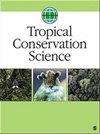新冠肺炎全球疫情期间媒体的作用:保护视角
IF 1.6
4区 环境科学与生态学
Q2 BIODIVERSITY CONSERVATION
引用次数: 6
摘要
新冠肺炎大流行正在迅速推动生活方式和经济发展。在这项研究中,我们以津巴布韦为案例研究,评估不同形式的媒体如何被用来获取新冠肺炎疾病的信息(年龄、教育水平和就业状况)。我们调查了人们对新冠肺炎起源的看法,它对人类继续食用野生动物肉类的影响,以及对携带冠状病毒的野生动物物种的管理策略。我们使用在线结构化问卷调查收集了139份回复。与传统来源(电视、广播和报纸)相比,社交媒体平台被用来获取有关新冠肺炎大流行的信息。大多数受访者认为新冠肺炎病毒是由人类制造的(n = 55,主要是年轻人和中年人),而其他人则认为它起源于动物(n = 54岁,大部分为具有研究生学历的中年人)。大多数(73%)以新冠肺炎起源为动物的受访者也支持禁止食用该物种的肉类。中年受访者(与年轻人和老年人相比)和有工作的人(与失业者相比)更有可能支持野生动物贸易禁令。考虑到新冠肺炎的后果,与年轻和中年受访者相比,老年受访者访问野生动物中心的可能性显著降低。我们的研究结果强调了科学渗透社交媒体圈子以提供适当信息的必要性。观察到的对参观野生动物中心的看法可能会对保护资金产生负面影响。本文章由计算机程序翻译,如有差异,请以英文原文为准。
The Role of Media During COVID-19 Global Outbreak: A Conservation Perspective
The COVID-19 pandemic is fast driving the ways of life and economies. In this study, we used Zimbabwe as a case study to assess how different forms of media are being utilised to access information of the COVID-19 disease (across age, educational level, and employment status). We investigated people’s perceptions of the origins of COVID-19, its implication on the continued consumption of meat from wildlife species by humans, and management strategies of wildlife species that harbour the coronavirus. We gathered 139 responses using an online structured questionnaire survey. Social media platforms were used to acquire information on the COVID-19 pandemic when compared to traditional sources (television, radio, and newspapers). Most respondents thought that the COVID-19 virus was created by humans (n = 55, mostly the young and middle-aged) while others believed that it originated from animals (n = 54, mostly middle-aged with postgraduate qualifications). The majority (73%) of respondents who cited COVID-19 origin as animals also supported a ban on consumption of meat from the species. The middle-aged respondents (in comparison to the young and older respondents) and those who were employed (compared to the unemployed) were more likely to support the ban in wildlife trade. The likelihood of visiting wildlife centres given the consequences of COVID-19 was significantly lower in the old-aged respondents when compared to the young and the middle-aged respondents. Our results emphasize the need for science to penetrate social media circles to provide appropriate information. The observed perceptions about visiting wildlife centres could negatively impact conservation funding.
求助全文
通过发布文献求助,成功后即可免费获取论文全文。
去求助
来源期刊

Tropical Conservation Science
BIODIVERSITY CONSERVATION-
CiteScore
3.60
自引率
5.90%
发文量
16
审稿时长
>12 weeks
期刊介绍:
Tropical Conservation Science is a peer-reviewed, open access journal that publishes original research papers and state-of-the-art reviews of broad interest to the field of conservation of tropical forests and of other tropical ecosystems.
 求助内容:
求助内容: 应助结果提醒方式:
应助结果提醒方式:


